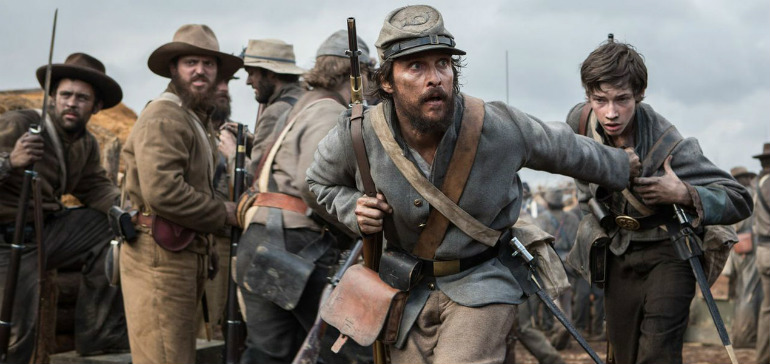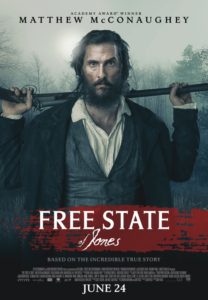
Directed by Gary Ross
Written by Leonard Hartman, Gary Ross
Starring Matthew Mcconaughey, Gugu Mbatha-Raw, Mahershala Ali
 I’m about as far away as you can get from being a libertarian. I believe in publicly funded services and socially-minded government intervention. It’s an easy stance to take since I have the privilege of knowing that my government is on the side of common good. Free State of Jones takes place at a turning point of history where the ethics of government and the existence of that privilege aren’t so clear. The film evokes these politics by praising the life of a man who fought against the system for his own needs. With a two and a half hour runtime, Free State of Jones unfortunately meanders through its plot with an imbalanced story and conflicting messages that makes the final message of the picture fall flat.
I’m about as far away as you can get from being a libertarian. I believe in publicly funded services and socially-minded government intervention. It’s an easy stance to take since I have the privilege of knowing that my government is on the side of common good. Free State of Jones takes place at a turning point of history where the ethics of government and the existence of that privilege aren’t so clear. The film evokes these politics by praising the life of a man who fought against the system for his own needs. With a two and a half hour runtime, Free State of Jones unfortunately meanders through its plot with an imbalanced story and conflicting messages that makes the final message of the picture fall flat.
The opening shots of Free State of Jones exposes the immediacy of death in the Civil War. Men marching on the front lines get shot and fall as the line carries on without them. It’s a savage scene that speaks to the futility of the South’s fight and the waste of human life that accompanies violent action. This is not a typical civil war film, however. After Newton Knight is confronted with the death of a young boy from home, he’s told it was an honourable death. “No, he just died” is the response. Over the course of the lengthy runtime, Newton goes from war nurse to deserter to revolutionary, though the line between those last two is never made too clear.
In an untimely message, Free State of Jones evangelises guns and libertarianism, playing government as the bad guy and continually hammering home messages that preach independence and self-serving values. We see the government behaving abhorrently, taking food, blankets, and clothing away from ‘decent folk’ to be used in the war. Newton’s answer to every problem in this book is to pick up a gun and fight for his own. The timing of this message after shootings like Orlando or the Democratic Sit-In just does not sit well at a time when we need to reconsider the place of firearms in society.
Regardless of my views on the film’s agenda, Free State of Jones is crafted well. While its most memorable scenes will be those of visceral war, it more rapturously excels in quiet moments. Beautiful imagery and spectacles of nature make a profound impact in this film, as the music falls to a dead stop and birds and insects take over the audio track, it becomes almost meditative. Scenes like Newt and Benjamin rowing through the swamp or a young boy dying in the shade of an old tree are gorgeous shots to look at and there is a real eye for what makes Missouri a paradise for so many. The scene in the church is almost an inversion of this idea. It’s quiet, but pitch dark in terms of tone. the minimal use of sound and camera angles to make the church seem stark and haunting.
Mcconaughey owns the role of Newton Knight with a commanding performance brimming with wide-eyed determination. His character is arrogant and stubborn. The combination propels him forward. He doesn’t consider the ramifications that his actions will have on those around him. It’s a flaw that crops up repeatedly as those around him are taken down and makes for a much more interesting character if you read him as such, rather than the white-hatted hero the marketing campaign wants you to believe.
The supporting cast of Free State of Jones contains many key characters who are portrayed by persons of colour, though the degree of what they’re given to do is inconsistent. Mahershala Ali plays Moses Washington with an constant presence of dignity and pride. First seen as a runaway slave, he grows in stature throughout the film into a politician and man of the people through a natural course of events. I feel like I appreciate him more for his lack of participation. In a post-war sequence when his son is taken back to the fields, he almost tips the scales into sinking to Newt’s level of emotional reaction, but Newt himself stops him, allowing Moses to remain a vigil for democracy, who is only held back, not defined, by the colour of his skin.
Gugu Mbatha-Raw, as Newt’s lover Rachel, is unfortunately not given the same level of agency she deserves in this story, and many of her scenes see her as either subservient or accommodating to the whims of white men. Even when the men are on her side, the ultimate decisions are not her own. The implication that she has been raped by her “master” is an obvious use of a horrible act to garner audience empathy, and her own anger at the act never comes into play in a moment of catharsis. A stock ‘slave’ character in a film that’s more concerned with the needs of a white middle-class against the rich, Mbatha-Raw does the best with what she’s given to craft, at the very least, a woman with a compassionate heart and a desire to learn.
At two and a half hours, Free State of Jones is longer than it needs to be. Worse still is how it loses momentum after the independence of Jones falls at the conclusion of the Civil War and things return to a state of status quo. Newton Knight’s story already feels like it has an arc, and even though there’s a different kind of fighting to be done in the South after the battles are over, it loses the kinetic energy that was so present in the first two thirds of the film. The film addresses this with documentary-like features. The graphic design of these title cards and photographs do have excellent aesthetic appeal, but they give off the feeling that the film is here to teach rather than entertain.
About four times in the whole film, we cut to a 1960s plot that takes the film out of Newt’s story and into that of one of his descendants: accused of marrying a woman while he is allegedly one-eighth black. As a framing device, the film doesn’t set it up early enough in the running time for me to care about these characters and it’s clear that they are only here to strengthen the theme of race while still wringing some kind of victory from the plot. These scenes didn’t belong in the movie and made me feel like someone was flipping channels, even while I was engrossed in the Newton Knight storyline.
Which brings me to the main issue with the film, in that the subjects of race and racial oppression are not actually a primary concern for our main characters or plot. Until about two thirds of the way through the film, the only opposition to freed slaves joining the white men as equals is voiced by one character who is quickly shot down by Newt. The character is dismissed in the moment and karmically punished later, while the rest of the party carries on rebelling against the South for the sake of independent freedoms. While the post-war section of the film includes a fight against white oppressors, the main drive for why Newton fights so hard against the Confederate soldiers is that they’re taking resources from the white lower class. Which is fine on its own. Although it’s not my viewpoint, the film could have worked on that basis.
The Verdict
Wait For It. I have an opposition to Free State of Jones. While I enjoyed its lush setting and tenderness in quiet moments, that conflict I feel with the focus on guns and violence within the picture comes at the wrong time in history. There was much that could have been cut to allow a shorter running time, including a totally unnecessary subplot that seemed to distract from the movie’s themes. Another strong performance from Matthew Mcconaughey adds to his stature as a late-blooming force of acting, but Free State of Jones is still not quite as revelatory as his work in True Detective or Interstellar to make it a memorable experience.



